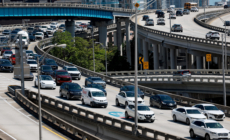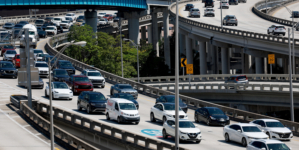-
Column: White Sox vs. Angels. In Anaheim. The worst baseball game ever? - 17 mins ago
-
Alaska Man Charged With Threatening Supreme Court Justices - 24 mins ago
-
BetMGM Bonus Code NEWSWEEK1500: Get $1.5K Patriots-Jets First Bet Offer - 32 mins ago
-
Torch-wielding man arrested on suspicion of setting fires in Beverly Hills - 59 mins ago
-
Florida Sees Drop in People Quitting Jobs as ‘Genuine Fear’ Takes Hold - about 1 hour ago
-
Stocks Hit Record High a Day After Fed’s Big Interest Rate Cut - about 1 hour ago
-
Gov. Newsom signs package of bills to spur more affordable housing - 2 hours ago
-
Martha Stewart Shares Bold Opinion on Ina Garten’s Behavior In Prison - 2 hours ago
-
The Fed Rate Cut Was a Tough Call That’s Good For Our Economy - 2 hours ago
-
Chargers QB Justin Herbert is Attempting to Play Through Significant Injury - 2 hours ago
Full List of Republicans Who Voted Against Mike Johnson’s Funding Bill
The House of Representatives struck down a stopgap bill backed by Speaker Mike Johnson on Wednesday, with over a dozen Republicans defying the chamber’s leadership and voting against the measure.
The continuing resolution (CR) bill would have extended the current government funding levels for another six months, funding the government until March 25—lawmakers have until September 30 to pass a spending bill in order to avoid a government shutdown. The package also included the controversial SAVE Act, which would require voters to provide proof of citizenship in person when registering to vote in a federal election.
The CR was rejected in a 202 to 220 vote, with 14 Republicans voting against it. Three Democrats voted in favor of the spending package. Johnson told reporters after the vote that he was “disappointed” the measure didn’t pass but that he would look for a way forward.
“We ran the play. It was the best play; it was the right one,” Johnson said, per a report from ABC News. “So now we go back to the playbook. We’ll draw up another play, and we’ll come up with a solution.”

Kevin Dietsch/Getty Images
Below is a list of Republicans who rejected the stopgap bill.
- Jim Banks, Indiana
- Andy Biggs, Alabama
- Lauren Boebert, Colorado
- Tim Burchett, Tennessee
- Elijah Crane, Arizona
- Matt Gaetz, Florida
- Wesley Hunt, Texas
- Doug Lamborn, Colorado
- Nancy Mace, South Carolina
- Cory Mills, Florida
- Mike Rogers, Alabama
- Matt Rosendale, Montana
- W. Gregory Steube, Florida
- Beth Van Duyne, Texas
Several conservatives had ripped Johnson for pushing the CR earlier in the week, including Kentucky Congressman Thomas Massie, who said on the House floor on Wednesday that the legislation is “insincere and unserious.”
“Your bill does NOT responsibly fund government,” Massie wrote to X, formerly Twitter, in response to a post from Johnson. “It’s 12 bills rolled into one bill that continues the profligate spending that’s ruining our country. The fact that you’ve added a 13th bill to it does not make it a serious solution. Please quit insulting our constituents.”
Georgia Representative Marjorie Taylor Greene, a prominent Trump ally, also ripped the CR in a post to X, writing on Tuesday that the bill “is classic bait and switch that will enrage the base, only one month before the election, when they find out they have been tricked and let down again.”
Both Massie and Greene voted “present” on Wednesday.
Johnson had blamed Senate Democrats for not bringing any spending measures to the floor and instead putting House Republicans “in this situation.” Senator Susan Collins, a Republican from Maine, has also put pressure on Senate Majority Leader Chuck Schumerto bring a full-year funding bill to the floor. Collins told the chamber on Wednesday, “It does not have to be this way.”
“The Senate is not doing its job,” Collins added. “We should be considering these bills, not engaging in show votes.”
Former President Donald Trump had instructed congressional Republicans to only back the CR if it included the SAVE Act, writing on his Truth Social before Wednesday’s vote, “If Republicans don’t get the SAVE Act, and every ounce of it, they should not agree to a Continuing Resolution in any way, shape, or form.” Republicans have pushed for the voter ID bill for months as Trump and his allies continue to push concerns about fraud in the upcoming election in November. Studies have shown that instances of election fraud are extremely rare in the United States.
Trump’s post also baselessly claimed that Democrats are “registering Illegal Voters by the TENS OF THOUSANDS” to vote in November. There is no evidence to support such claims, although a poll released Wednesday from Scripps News/Ipsos found that over half of Americans (51 percent) say they are worried about “non-citizens voting illegally” in the 2024 election.
It is already illegal for noncitizens to vote in a federal election. Federal law does not prevent states from granting the right to vote to noncitizens at the state and local level, however, and laws have been passed in California, Maryland and Vermont to extend voting rights to noncitizens in some or all local elections.
Nearly all House Democrats voted against the SAVE Act when it was passed back in July. Opponents of the measure have argued that it would place an extreme burden on American citizens wanting to vote in federal elections.
Newsweek reached out to Johnson’s office for further comment via email Wednesday night.
Source link














